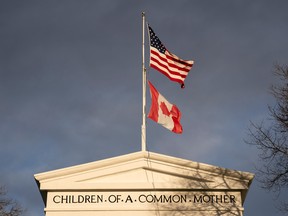
Article content
By Peter Shawn Taylor
THIS CONTENT IS RESERVED FOR SUBSCRIBERS ONLY
Subscribe now to read the latest news in your city and across Canada.
- Exclusive articles from Barbara Shecter, Joe O'Connor, Gabriel Friedman, and others.
- Daily content from Financial Times, the world's leading global business publication.
- Unlimited online access to read articles from Financial Post, National Post and 15 news sites across Canada with one account.
- National Post ePaper, an electronic replica of the print edition to view on any device, share and comment on.
- Daily puzzles, including the New York Times Crossword.
SUBSCRIBE TO UNLOCK MORE ARTICLES
Subscribe now to read the latest news in your city and across Canada.
- Exclusive articles from Barbara Shecter, Joe O'Connor, Gabriel Friedman and others.
- Daily content from Financial Times, the world's leading global business publication.
- Unlimited online access to read articles from Financial Post, National Post and 15 news sites across Canada with one account.
- National Post ePaper, an electronic replica of the print edition to view on any device, share and comment on.
- Daily puzzles, including the New York Times Crossword.
REGISTER / SIGN IN TO UNLOCK MORE ARTICLES
Create an account or sign in to continue with your reading experience.
- Access articles from across Canada with one account.
- Share your thoughts and join the conversation in the comments.
- Enjoy additional articles per month.
- Get email updates from your favourite authors.
THIS ARTICLE IS FREE TO READ REGISTER TO UNLOCK.
Create an account or sign in to continue with your reading experience.
- Access articles from across Canada with one account
- Share your thoughts and join the conversation in the comments
- Enjoy additional articles per month
- Get email updates from your favourite authors
Sign In or Create an Account
or
Article content
U.S. President Donald Trump’s America First Trade Policy, formally launched as soon as he took office in January, has upended world trade by imposing substantial tariffs on imports from nearly all countries. In Canada, long considered America’s closest ally and best trading partner, the initial imposition of 25 per cent tariffs despite the presence of the Canada-U.S.-Mexico Agreement — successor to NAFTA, the North American Free Trade Agreement — was seen as a deep insult, as well as an economic nightmare. With Canadians having enjoyed free trade with the U.S. since 1989, any restriction to that access is now considered a serious provocation.
Article content
Article content
Article content
The new Liberal government of Mark Carney quickly retaliated with counter-tariffs, leading to a further response from the White House. Additional moves included on-again, off-again “grace periods” or deferrals of certain tariffs by Trump, plus new threats and the quiet exemption of all items previously covered by CUSMA. Amid all the chaos and uncertainty, a wave of economic and political nationalism has swept across Canada. As the 2025 federal election campaign unfolded, voters told pollsters that the party leaders’ ability to stand up to Trump was now a key factor in their voting intentions. Such sentiment eventually handed a surprising win to Carney, who made much of his plans to get tough with the U.S. president.
Article content
By signing up you consent to receive the above newsletter from Postmedia Network Inc.
Article content
In their role as consumers, Canadians vowed to punish their American neighbours with “Buy Canadian” pledges and a boycott on U.S. travel. Due in part to Los Angeles-resident Canadian Mike Myers making the gesture on a hallowed U.S. comedy show, Saturday Night Live, “Elbows Up!” became a national catchphrase. When Statistics Canada reported Canada’s trade with the U.S. in May had slipped to 68.3 per cent of total exports, down from the 2024 average of 75.9 per cent, headlines such as “Canadians begin to diversify trade” and “Efforts to broaden trade in Canada working” treated it as a reason to celebrate, since it suggested the country was moving past its dependency on perfidious America. For most Canadians, the Trump tariff war is the biggest disruption in Canada-U.S. relations they’ve ever experienced. And many seem determined to make their neighbours suffer for it.
Article content
Article content
Among those with a longer perspective, however, the recent ructions are just one more episode in a long-running economic soap opera that began way back in 1854. “For most of Canadian history,” observes Asa McKercher, a political scientist at the Brian Mulroney Institute of Government at St. Francis Xavier University, “there has been this merry-go-round of alternating protectionism and openness from the U.S., which then leads to a subsequent Canadian response.”
Article content
Article content
Article content
There was free trade between the United States and Canada before there was a country called Canada. The Reciprocity Treaty of 1854 came into force 13 years before Confederation. Also known as the Marcy-Elgin Treaty, after chief negotiators William L. Marcy, the U.S. Secretary of State, and Lord Elgin, Governor-General of British North America, it enabled bilateral free trade in raw and lightly-refined goods, including meat, grains, vegetables, tobacco, coal, pitch, tar and lumber. Mutual fishing rights were also included.
Article content
According to Canadian historian D.C. Masters, the agreement was “a skilfully drafted compromise” that set off a tremendous economic boom throughout British North America, which then consisted of the United Province of Canada (Ontario and Quebec) plus New Brunswick, Nova Scotia and Prince Edward Island. Before the treaty, cross-border commerce stood at $18.9 million; in 1855 it shot up to $42.8 million and by 1866 it had more than tripled to $73.3 million. Then politics got in the way.

.jpg) 5 hours ago
1
5 hours ago
1
 English (US)
English (US)